- Home
- Walt Whitman
Specimen Days & Collect
Specimen Days & Collect Read online
PRAISE FOR WALT WHITMAN AND SPECIMEN DAYS AND COLLECT
“He is a great poet, our first, and it is unlikely indeed that his contribution to what it literally means to be an American poet will ever be equaled.”
—ROBERT CREELEY
“I like or love Whitman unreservedly; he operates with great power and beauty over a very wide range.”
—JOHN BERRYMAN
“Whitman’s plan was to display an ideal democrat, not to devise a theory.”
—JORGE LUIS BORGES
“I know no writer whose vision is as inclusive, as all-embracing as Whitman’s.”
—HENRY MILLER
“Whitman has gone further, in actual living expression, than any man, it seems to me.”
—D. H. LAWRENCE
“Whitman was probably the first person in America who was not ashamed of the fact that he thought things that were as big as the Universe.”
—ALLEN GINSBERG
“His discovery of himself is a discovery of America; he is able to give it to anyone who reaches his lines.”
—MURIEL RUKEYSER
“I believe that long before Whitman came on the scene, ever since Milton in fact, poets writing in English unconsciously hungered for such a music as Whitman was to discover.”
—GALWAY KINNELL
SPECIMEN DAYS AND COLLECT
WALTER “WALT” WHITMAN (1819–1892) was born on May 31, 1819, in Huntington, New York. He left school at age eleven and went to work, first as an office boy, then as a printer’s devil and compositor at numerous newspapers in New York City—he even founded his own paper, the Long Islander, but sold it after ten months. His first publications were poems published anonymously in the New York Mirror. In the early 1850s, he began work on a collection of poetry, Leaves of Grass, which he paid to have printed at a local print shop. He would continue to revise the book over the course of his life, publishing by some counts nine different editions. The first edition was immediately polarizing: critics condemned it for its frankness about sexuality and its free-verse style. But others, like Ralph Waldo Emerson, saw in it a brilliant and uniquely American voice—in a letter thanking him for the book, Emerson wrote, “I greet you at the beginning of a great career.” In 1862, in the midst of the Civil War, Whitman left New York and headed south to search for his brother George, who had been wounded at the Battle of Fredericksburg. Whitman found him safe and sound, but was so deeply affected by the sight of the devastation wrought by the war that he moved to Washington, D.C., and volunteered as a nurse in army hospitals. He also had a series of government jobs, including working for the Secretary of the Interior—who subsequently fired Whitman on “moral grounds,” purportedly after reading Leaves of Grass. In the period after the war, Whitman published another collection of poetry, Drum-Taps, and the influential essay, “Democratic Vistas.” In 1873, he moved to his brother’s house in Camden, New Jersey, to recover from a stroke. He would spend his final years there, surrounded by visitors and friends, among them Oscar Wilde and Thomas Eakins. When he died at the age of seventy-two, thousands followed his funeral procession.
LESLIE JAMISON is the author of a collection of essays, The Empathy Exams, and a novel, The Gin Closet. She is a regular columnist for The New York Times Book Review.
THE NEVERSINK LIBRARY
I was by no means the only reader of books on board the Neversink. Several other sailors were diligent readers, though their studies did not lie in the way of belles-lettres. Their favourite authors were such as you may find at the book-stalls around Fulton Market; they were slightly physiological in their nature. My book experiences on board of the frigate proved an example of a fact which every booklover must have experienced before me, namely, that though public libraries have an imposing air, and doubtless contain invaluable volumes, yet, somehow, the books that prove most agreeable, grateful, and companionable, are those we pick up by chance here and there; those which seem put into our hands by Providence; those which pretend to little, but abound in much. —HERMAN MELVILLE, WHITE JACKET
SPECIMEN DAYS AND COLLECT
Originally published by Reed Welsh & Co., Philadelphia, 1882
Copyright © 2014 by Melville House
Introduction copyright © 2014 by Leslie Jamison
First Melville House printing: November 2014
Melville House Publishing
145 Plymouth Street
Brooklyn, NY 11201
and
8 Blackstock Mews
Islington
London N4 2BT
mhpbooks.com facebook.com/mhpbooks @melvillehouse
Library of Congress
Cataloging-in-Publication Data
Whitman, Walt, 1819–1892.
[Prose works. Selections]
Specimen days; & Collect / Walt Whitman; introduction by Leslie Jamison.
pages cm — (Neversink)
ISBN 978-1-61219-386-1 (paperback)
ISBN 978-1-61219-387-8 (ebook)
1. Whitman, Walt, 1891–1892—Diaries. 2. Poets, American—19th century—Diaries. 3. United States—History—Civil War, 1861–1865—Personal narratives. 4. United States—History—Civil War, 1861–1865—Hospitals. 5. United States—Civilization—19th century. I. Jamison, Leslie, 1983– II. Whitman, Walt, 1819–1892. Specimen days. III. Whitman, Walt, 1819–1892. Collect. IV. Title. V. Title: Specimen days and Collect.
PS3220.A1 2014
818 .308—dc23
2014031520
Design by Christopher King
Cover photograph: Walt Whitman, 1863. Courtesy of the Library of Congress Prints and Photographs Divison.
v3.1
CONTENTS
Cover
About the Authors
Title Page
Copyright
Introduction by Leslie Jamison
Specimen Days.
Collect. Notes Left Over.
Appendix. Pieces in Early Youth. 1834–’42.
INTRODUCTION
BY LESLIE JAMISON
What is Specimen Days? It doesn’t sit easily in any genre. It’s restless in its recounting. Structurally, it’s a collection of prose fragments written across two decades of Walt Whitman’s life: his hospital visits during the Civil War; his recovery from a paralyzing stroke; his jaunts through the broad western states of America; his delight at trees and moths and glow-worms; his disappointment at the posturing of prairie women. In his own words, it’s a “mélange of loafing, looking, hobbling, sitting, traveling—a little thinking thrown in for salt, but very little—… wild and free and somewhat acrid—indeed more like cedar-plums than you might guess at first glance.”
This is signature Whitman, deploying the rhetoric of explanation to make everything more mysterious: more like cedar-plums than you might guess at first glance. He’s right, of course: I hadn’t imagined this book like cedar-plums at all. After helpfully describing what cedar-plums are (bunches of “china-blue” berries that grow along the cedar’s “thick woolly tufts”), Whitman explains that they resemble the book in “their uselessness growing wild—… thin soil whence they come—their content in being let alone—their stolid and deaf repugnance to answering questions.” Questions like the one that opened this introduction: What ARE you, anyway? We are invited to imagine the cedar-plums hanging there, blank-faced, refusing our inquiries.
It’s a question perhaps best answered by way of list. The book is full of them—lists of trees, lists of cities—and other accumulations, joyous and jarring: summer pleasures, urban streetscapes, bodies strewn across battlefields. The form of the list offered Whitman a kind of honesty in its refusal to imply any false totality or polish: it was just a rough accounting, a ledger of the war dead, a catalog of the wo
rld.
Whitman initially journeyed to the battlefields of the Civil War for personal reasons. After seeing a name he feared was his brother George’s listed among wartime casualties, in December 1862, he headed to Fredericksburg, where he discovered George had only suffered minor facial lacerations. But this was just the beginning: Whitman started visiting soldiers in hospitals—tens of thousands, all told—and doing what he could: writing letters to families, dressing wounds, bringing treats—rice pudding or blackberry syrup. (He once distributed ice cream to all eighteen wards of Carver Hospital.) The relationships he formed, as evidenced in the tender letters he exchanged with many of his charges, were a strange mixture of fraternal, paternal, and amorous. He wanted to demonstrate affection, bring cheer, and bear witness. On August 10, 1863, he wrote to the parents of a soldier named Erastus Haskell, sick with typhoid: “I write you this letter, because I would do something at least in his memory—his fate was a hard one, to die so— He is one of the thousands of our unknown American young men in the ranks about whom there is no record or fame, no fuss made about their dying so unknown.”
We can read the Civil War material in Specimen Days as a record of these unknown deaths—a fuss made, finally—though its fragments also confess the impossibility of expressing the full scale of this loss. One section is titled “The Real War Will Never Get in the Books”; another, called “The Million Dead, Too, Summ’d Up,” offers its corpses in fragmentary bursts of exclamation: “The dead in this war—there they lie, strewing the fields—… the varieties of the strayed dead,… the crops reap’d by the mighty reapers, typhoid, dysentery, inflammations—… the corpses floated down the rivers …” And on and on.
And yet Specimen Days insists upon the robust natural world as companion and aftermath to this suffering, not by argument so much as juxtaposition. Much of the bliss of this book lives in its particulars: watching kingfishers with their milk-white necks splashing water into jets of diamonds; appreciating the “sea-prairies” of salt-grass meadows on the Jersey shore or a field of “malachite green” cabbages, watching a squirming flotilla of red worms wriggling out of the soil after a rainstorm, finding the white-flowering wild carrot, appreciating the “doubled brightness” of nighttime fishermen’s candles floating on the sea.
Whitman’s democratic awe is distinctive not simply for its range and its exuberance and its surprise, but for its willingness to dwell—to unfurl a pleasure fully. “Let me say more about the song of the locust, even to repetition,” he says, and does—“like a brass disk whirling round and round.” He also loves the sound of ice giving way to sunlight, and isn’t afraid to parse the pleasure: the “occasional crunch and cracking of the ice-glare congeal’d over the creek, as it gives way to the sunbeams—sometimes with low sigh—sometimes with indignant, obstinate tug and snort.”
Part of our pleasure in reading his book, in turn, is not just feeling close to his sensory perceptions, but feeling invited more deeply into our own—to feel the world more fully in all its snorting ice and malachite cabbages and whirling locusts and wriggling worms. For Whitman, rehabilitating from a stroke years after the war—with his self-designed program of physical therapy, taking mud baths and wrestling with young trees—nature was a kind of nursemaid: “How it all nourishes, lulls me, in the way most needed; the open air, the rye-fields, the apple orchards.” In this way, we see how some specimen days give way to others—it’s no longer Whitman ministering to soldiers but nature ministering to Whitman, inviting him back into the physical wonder of the world after he had been so willing to dwell so long—so deeply, so unbearably—with the most unimaginable kind of physical damage. These “blood-smutch’d little notebooks” don’t let us forget the war, but they don’t let us forget the world that survived it either.
In fact, this book wants to hold as much of that surviving world as it can. It wants to hold the trees—“Persimmons … Hornbeam … Gum-trees, both sweet and sour”—and the blossoms, especially the most wild—“wild honeysuckle, wild roses … wild geranium”—and even the “friendly weeds” of its author’s daily strolls: “snakeroot … dandelions … bloodroot.” It wants to honor everything. In the section called “A Civility Too Long Neglected,” Whitman announces that he wants to dedicate the second half of his book to the creatures he celebrates in its pages: water-snakes, mosquitoes, peppermint, moths “great and little.” But the dedication is bursting at the seams; it wants to grasp too much. He dedicates the book to “cat birds (and all other birds),” “tulip-trees (and all other trees).” The whole thing dissolves into an effusion of incandescent worms: “glow-worms, (swarming millions of them indescribably strange and beautiful at night).” This indecision is the mark and signature of his attention. His poetry isn’t the poetry of choosing between; it’s the poetry of inclusion and accumulation. The worth is everywhere, the song electric in everything: the coarse and the crude beside the fine, the gritty and the dirty beside the polished.
It makes sense, then, that alongside Specimen Days we get Collect, a heterogeneous gathering of other texts: several prologues to Leaves of Grass, including the original 1856 edition (a fine piece of prose in its own right), various pieces of critical writing that not so subtly suggest Whitman’s sense of his own central role in the culture: (“Strange as it may seem, the topmost proof of a race is its own born poetry”), and “Democratic Vistas,” Whitman’s take on the failures and possibilities of American democracy in the wake of the Civil War.
“The Collect afterward gathers up the odds and ends of whatever pieces I can now lay hands on,” Whitman explained, “… and swoops all together like fish in a net.” It might gather them like fish in a net, but it manages to keep them live—swimming, breathing, glimmering—because it doesn’t ask them to perform a kind of thematic coherence that isn’t organic to their natures.
There is something glorious about the scattered thematic concerns of both Collect and Specimen Days—the way their unabashed ranging feels organic to the workings of a mind in all its wanderings. In a list of alternate titles, Whitman honors the volume’s stubborn refusal of genre: Not only the charmingly awkward Cedar-Plums Like (for by-now obvious reasons), but As the Wild Bee Hums in May; Away from Books—away from Art; Notes of a half-Paralytic; Ducks and Drakes; Gossip at Early Candle-light; Sands on the Shore of 64 (he was sixty-three); A Life-Mosaic … Native Moments; Again and Again. It’s this final title—the last in Whitman’s list of thirty-five—that intrigues me most: Again and Again. He wanted to do justice to repetition and ongoingness, the again and again of life, the constant onslaught of impressions in all their constancy and incoherence. He was open to meaning at every moment. It was tiring; it was joyous.
Finally, of course, Whitman chose the title Specimen Days, but for him the notion of a specimen wasn’t anything clinical or dissecting; it was a mode of celebration. He wanted to preserve “specimen interiors” from his “strange, unloosen’d, wondrous time”; he wanted to commemorate “a regular Irish boy, a fine specimen of youthful physical manliness—shot through the lungs—inevitably dying.” Specimens exemplified ideals and represented the possibilities of citizenship and masculinity, being an individual in a collective. Types weren’t a way of reducing anyone so much as a way of organizing the world’s abundance. Whitman was on the lookout everywhere for specimens to praise. (Except Kansas City, where he found the women lacking the “high native originality of spirit or body” he saw evident in their male counterparts—instead they seem “dyspeptic-looking and generally doll-like.”) He returned the specimen to its etymological roots: the Latin word for “that by which a thing is known, means of knowing,” from the verb specere, “to look at.” Specimens, for Whitman, weren’t just about typicality and representative capacity; they were a way of learning—re-learning—how to see.
“There Was a Child Went Forth,” a poem Whitman once called “the most innocent thing I ever did,” begins by envisioning perception as a kind of union:
There was a child went f
orth every day;
And the first object he look’d upon, that object he became;
And that object became part of him for the day, or a certain part of the day,
or for many years, or stretching cycles of years.
Specimen Days is Whitman’s attempt to document all the objects that become part of him across the course of one stretching cycle. In these fragments, he is perpetually fascinated by the possibility of absorbing the world and being absorbed by it. Describing the Jersey shoreline—trying to do justice to that horizon where ocean meets sky—he writes that he would be “quite satisfied if I could indirectly show that we have met and fused, even if only once, but enough—that we have really absorb’d each other and understand each other.”
Many of his musings in these pages resonate with his poetry in rewarding ways: his lyric refusal of dualism and his insistence on bodily experience, his constant celebration of visceral encounters and his pursuit of radical democratic intimacy. His close attention to bodily experience in Specimen Days—from the bliss of wandering nude through sunny grasslands to the horrors of amputated bodies during war—is born of the same voice that gave us “I Sing the Body Electric”: “And if the body were not the soul, what is the soul?” His focus on bodies isn’t solipsistic, a cloistered exploration of private experience, so much as a way of exploring commonality: “The thin red jellies within you or within me” are always understood as shared. His specimen days could populate the life of anyone. Their rapture and their pain—their veneration of the footless soldier or the humble peppermint moth—could belong to anyone. These are private days meant as public offerings.
The visions of war in Specimen Days resonate strongly with Drum-Taps, Whitman’s Civil War poems. We see piles of amputated limbs and boys moaning from pain in the night. We see the remains of their fallen comrades: “their skeletons, bleach’d bones, tufts of hair, buttons, fragments of clothing.” We see formal fragments as well: the broken, dash-strewn fields of violence, their jagged grammar. We see an ethos of care, a vision of Whitman’s ministrations that echoes poems like “The Wound-Dresser”: “From the stump of the arm, the amputated hand, / I undo the clotted lint, remove the slough, wash off the matter and blood.” We see drafts of the intimacies—“He behaved very manly and affectionate. The kiss I gave him as I was about leaving he return’d fourfold”—that in his poems swell into lyric superlatives: “poor boy! I never knew you, / Yet I think I could not refuse this moment to die for you, if that would save you.”

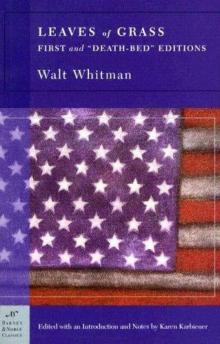 Leaves of Grass: First and Death-Bed Editions
Leaves of Grass: First and Death-Bed Editions Alone on the Beach at Night
Alone on the Beach at Night The Barbaric Yawp
The Barbaric Yawp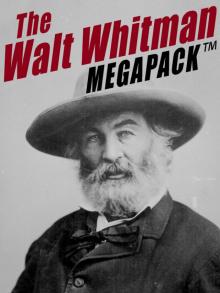 The Walt Whitman MEGAPACK
The Walt Whitman MEGAPACK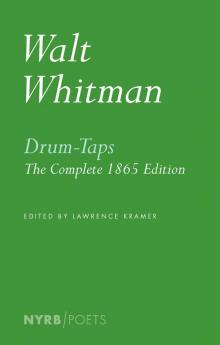 Drum-Taps: The Complete 1865 Edition
Drum-Taps: The Complete 1865 Edition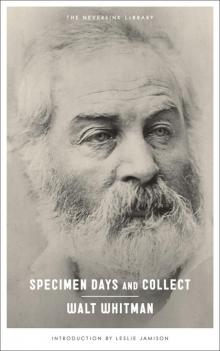 Specimen Days & Collect
Specimen Days & Collect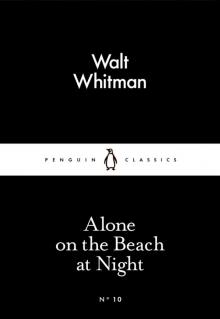 On the Beach at Night Alone
On the Beach at Night Alone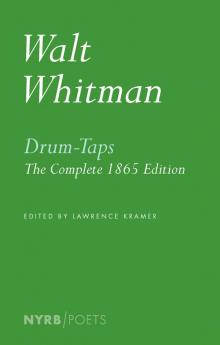 Drum-Taps
Drum-Taps